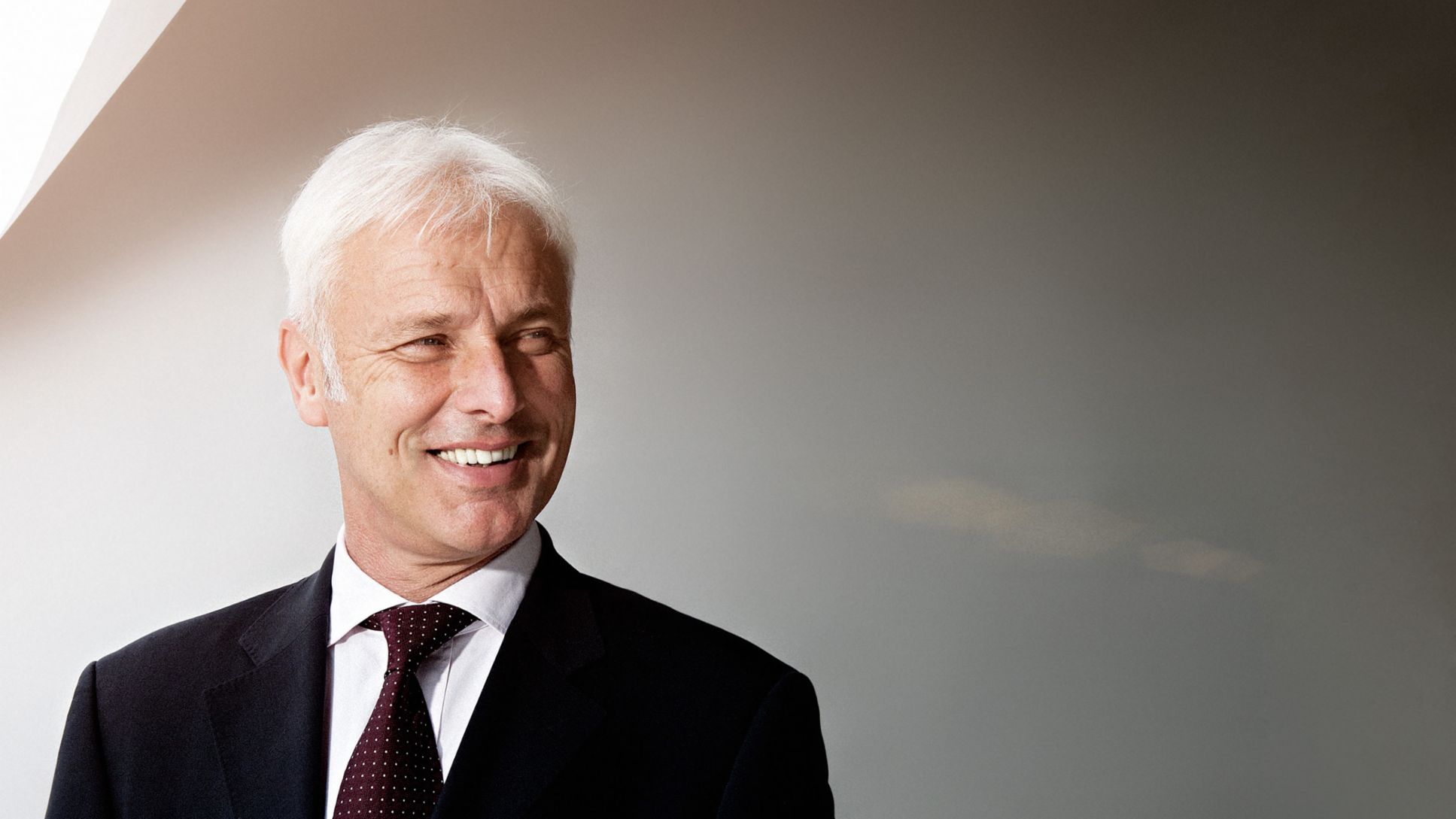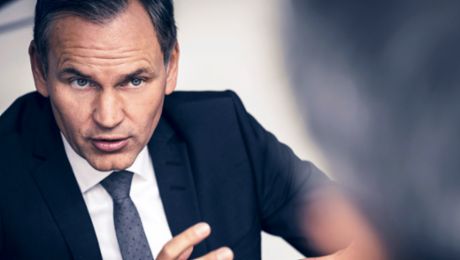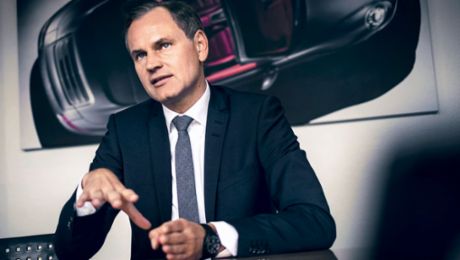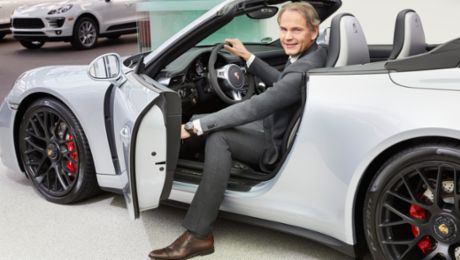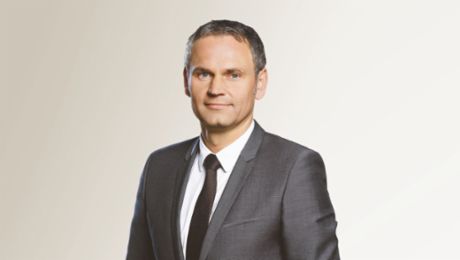Westfalen-Blatt: You can look back on a record year once again. Are you proud of that, or does it also scare you a little?
Müller: Such a result initially gives you a feeling of pride – a sense of satisfaction that you were once again able to finish a business year successfully. After all, that’s not something that happens by itself. There are always problems that need to be solved. Some markets can turn sluggish, for example, and sometimes we have to address quality issues.
At the same time, when I look at the last four years, I realise that growth is a taxing process. It costs money, increases fixed costs, and forces you to hire new employees. Our workforce at Porsche has nearly doubled, for example, and naturally we have to be careful that this doesn’t negatively affect our corporate culture. With all this in mind, I would have to say that I’m not afraid of growth, but at the least I do have great respect for it. We all have to be aware of the fact that the challenges we face don’t get any easier as our company grows.
You mentioned the word problems. Porsche vehicles have also been the subject of several recalls. Does that hurt your reputation? Do you feel you have to set the bar higher when it comes to your suppliers, and even your own company?
Recalls are a normal part of the automotive industry. Hardly a week goes by without one. I’m not going to take the easy way out and blame everything on our suppliers. Nevertheless, it’s also true that we receive deliveries with defective components from time to time, and it’s not possible to determine if a component is defective just by looking at it. Problems can then occur if we install such a component in a vehicle. We’ve had incidents like this, but fortunately their scope was rather limited. We need to start the quality assurance process at an earlier stage. On the other hand, suppliers also need to be more careful. None of this has anything to do with bad intentions on the part of suppliers, of course. Sometimes, they change a manufacturing process because a new one seems to be better or simpler, for example. However, if something goes wrong, the consequences can be devastating. Still, we also need to make our specifications more detailed in order to further reduce the risk of errors.
Do the large number of derivatives being introduced at an increasingly fast pace in the individual model series also pose a risk? How have customers been reacting to the accelerated pace of model-variant launches?
We haven’t had any problems as of yet. Our customers know how valuable and coveted our brand is. Moreover, the variety of the derivatives very much accommodates their desire for a vehicle that’s as unique as possible. No one needs to worry about the exclusivity of the brand either, as only three out of every 1,000 new vehicles are Porsche models. Nevertheless, we’re paying attention to this issue and continue to act very cautiously.
Which leads to the question as to how many derivatives you’re planning to introduce this year.
Right now in Detroit we’re presenting two new derivatives – the Targa GTS and the Cayenne Turbo S. In other words, we're starting the year off with exciting new products for our established and potential customers. Over the next few months, we will further expand our range of sporty variants, but I don’t wish to say anything more about that at this time.
Engines are getting more and more powerful, yet efficiency is becoming more and more important as well. How is Porsche dealing with this? Do you plan to introduce more model series with plug-in hybrid drives?
We’re very well positioned in terms of plug-in technologies and we’re also very satisfied with our position. We will expand our activities in this area, but I would also point out that the technology does more than just boost efficiency, as the additional electric drive unit also offers the potential to enhance driving fun even further. We’ve already demonstrated this with our Panamera, Cayenne, and 918 Spyder production models, not to mention the 919 racing car. However, because we remain a small company, we can’t just go out and immediately equip all of our model series with such a system. We have to determine what we can afford and what’s feasible. We will then set our priorities – but also always make sure our products remain appealing even as we develop them further.
Efficiency also means smaller and more economical engines. Does that mean you’re going to abandon the traditional naturally aspirated engines?
The CO2 issue is forcing us to switch to turbocharged engines. However, we’re also discussing the idea of occasionally offering a model with a naturally aspirated engine as a niche product – even though a turbo is a lot of fun to drive as well. Still, a naturally aspirated engine is in a class by itself, and we really don’t want to take away the fun the technology offers our customers.
Porsche vehicles are only manufactured in Germany at the moment. Will this remain the case, despite your rising sales? If so, won’t you have to expand your existing production facilities and hire even more new employees?
If the necessity does in fact arise, we will have to react. If an important market has obstacles such as taxes or customs regulations, you’ll eventually start building cars there rather than simply giving up that market. Up until now, however, we’ve seen no indications that we’ll have to do anything like that. Financially speaking, a new factory doesn’t become profitable until it produces 100,000 units. We don’t have any models that we sell on such a scale in China, for example. So, the whole idea doesn’t make any sense from a financial point of view. Nevertheless, we’re monitoring developments in various markets very closely in order to determine whether we might have to address this issue at a later point in time. If it comes to that, we’ll deal with it and come up with a solution.
What type of capacities are possible with your current plants? Does Porsche need to expand production further?
We just recently significantly expanded our plant in Leipzig and modernized our facility in Stuttgart. Osnabrück is producing at a high level in terms of volume and process quality. We built nearly 190,000 vehicles last year, which means we’re still not completely exploiting our total capacity. So, for the moment, there’s no need to expand our manufacturing facilities again. We need to be careful, and we don’t want to overextend ourselves. New working-time models would be an initial way to react to any increase in demand. We will also continue hiring new employees, but not as quickly as we’ve been doing as of late. We currently have 22,000 employees, and this number will likely rise to around 25,000 by the end of 2018.
More and more SUVs and sporty coupe-sedans as well are being built at your plants. Two-door sports cars now only account for around one-third of your total sales. Doesn’t this diminish Porsche’s reputation as a sports car manufacturer?
The answer is definitely no. We’re able to offer the sportiest vehicles in every segment we’re active in. This has always been our goal and it will remain our goal in the future. Our customers know this, and they appreciate what it means to own a Porsche.
Does the Volkswagen Group also appreciate Porsche?
We do our job and produce good results, and the people in Wolfsburg realise that. Of course, we get together regularly to exchange information and talk about where improvements should be made. Everyone involved benefits from this cooperation, and that’s really the main point. After all, why shouldn’t we take advantage of the benefits offered by such a large industrial group? In other words, our relationship with the Group is good for us and therefore ultimately good for our customers as well.
To conclude, just two questions about racing. How satisfied are you with the first year of the LMP1 project? Are you still feeling the sting from Le Mans, when your car was heading for a podium finish but had to exit the race shortly before the end?
It was a spectacular season. There’s really no need to say anything more than that. I didn’t really expect us to remain in the running from the very beginning or actually come close to winning some of the races. Our teams did a sensational job and they got their well deserved reward when they captured their first victory in the final race.
Le Mans was definitely an experience that we’ll never forget. The race was going great for us and we really had a good chance to finish second. It hurts when a technical system fails just a few laps before the finish line. I mostly felt sorry for the team, though. They deserved to have a spot on the podium.
What plans do you have for the 2015 World Endurance Championship season?
We’ll be using the same team in the new season, and we will also enter a third car for the races in Spa and Le Mans. This will give us a better chance of succeeding. We learned a lot in the first year of the project, and we’re going to put the experience we gained to work. We’re also very pleased with the support we receive from our sponsors, which include DMG Mori Seki from Bielefeld. We and our sponsors hope to achieve greater success in 2015.
Info
Interview first published in the German Newspaper "Westfalen-Blatt" on January 16. Editor: Wolfgang Schäffer.
Consumption data
911 (Type 991): Combined fuel consumption: 12,4 – 8,2 l/100 km; CO₂ emission: 289 – 191 g/km
918 Spyder: Combined fuel consumption: 3.1 l/100 km; CO₂ emission: 72 g/km; Electricity consumption 12.7 kWh/100 km
918 Spyder (Weissach package): Combined fuel consumption: 3.0 l/100 km; CO₂ emission: 70 g/km; Electricity consumption: 12.7 kWh/100 km
Boxster: Combined fuel consumption: 8.4 – 7.9 l/100 km; CO₂ emission: 195 – 183 g/km
Cayman: Combined fuel consumption: 8.4 – 7.9 l/100 km; CO₂ emission: 195 – 183 g/km
Cayenne: Combined fuel consumption: 11.2 – 9.9 l/100 km; CO₂ emission: 263 – 236 g/km
Cayenne (model year 2015): Combined fuel consumption: 11.5 – 6.6 l/100 km; CO₂ emission: 267 – 173 g/km
Macan: Combined fuel consumption: 9.2 – 6.1 l/100 km; CO₂ emission: 216 – 159 g/km
Panamera: Combined fuel consumption: 10.7 – 6.4 l/100 km; CO₂ emission: 249 – 169 g/km
